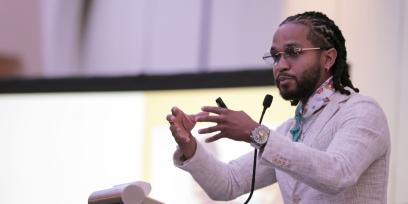A healthy democracy depends on informed participation, but participation depends on believing you can make a difference.
“The work of civic engagement is to prevent people from checking out, to go from ‘I don’t want to vote, it doesn’t matter,’ to ‘Maybe if I get involved, something will happen,’” said AFT President Randi Weingarten during “Every Day Is a Civics Lesson These Days,” a Lunch & Learn session at the TEACH conference. “It’s changing the sense that something is impossible to the sense that maybe it is just improbable.”
Tim Krueger, a civics teacher and member of AFT’s civics design team, agreed, saying that understanding the importance of your own voice needs to underscore civics education.
“If we think of civic education as pillars, with civic knowledge, skills, disposition and participation, those pillars are mutually reinforced; and understanding all of them leads to a feeling of agency,” he said. “That is absolutely indispensable if you want to uphold our democracy.”
And it is never too early to start, said civics design team member Rachel Thomas. “Kids have the ability to understand complex issues,” she said. “And it gets them ready for discussions in the higher grades.”
The key is putting together all the pillars in a way that imparts the information and instills a critical sense of agency. That’s where experiential learning and action civics come in, said Tia Costello, a high school civics teacher and another member of the civics design team.
“Action civics shows [students] that they have a choice,” Costello said. “It shows them they have agency and that they can be change-makers.”
An action civics project is the capstone of Costello’s curriculum, and she said some of her students have even gone on to impact state laws.
Raphael Bonhomme, who also serves on the civics design team, uses simulation and role-playing to bring civics to life for elementary students. Acting out various forms of civic participation, whether it’s voting, interacting with the mayor (or being the mayor), or finishing a major speech for union members when the union’s president has an allergic reaction to orange juice while speaking (which Weingarten also improvised for the group—though she is not actually allergic to orange juice).
The activity resulted in plenty of laughs from attendees; but for students, it also leads to the critical connection between what’s in a civics textbook and how it impacts their lives.
“That is what experiential learning does,” Weingarten said. “It makes the connection between knowledge and skills; it makes this relevant to kids and shows them why civics is important.”
[Melanie Boyer/Pam Wolfe photo]

